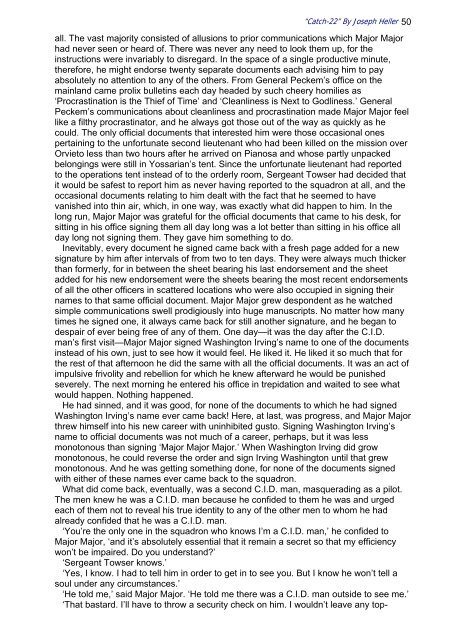You also want an ePaper? Increase the reach of your titles
YUMPU automatically turns print PDFs into web optimized ePapers that Google loves.
“Catch-22” <strong>By</strong> <strong>Joseph</strong> Heller 50<br />
all. The vast majority consisted of allusions to prior communications which Major Major<br />
had never seen or heard of. There was never any need to look them up, for the<br />
instructions were invariably to disregard. In the space of a single productive minute,<br />
therefore, he might endorse twenty separate documents each advising him to pay<br />
absolutely no attention to any of the others. From General Peckem’s office on the<br />
mainland came prolix bulletins each day headed by such cheery homilies as<br />
‘Procrastination is the Thief of Time’ and ‘Cleanliness is Next to Godliness.’ General<br />
Peckem’s communications about cleanliness and procrastination made Major Major feel<br />
like a filthy procrastinator, and he always got those out of the way as quickly as he<br />
could. The only official documents that interested him were those occasional ones<br />
pertaining to the unfortunate second lieutenant who had been killed on the mission over<br />
Orvieto less than two hours after he arrived on Pianosa and whose partly unpacked<br />
belongings were still in Yossarian’s tent. Since the unfortunate lieutenant had reported<br />
to the operations tent instead of to the orderly room, Sergeant Towser had decided that<br />
it would be safest to report him as never having reported to the squadron at all, and the<br />
occasional documents relating to him dealt with the fact that he seemed to have<br />
vanished into thin air, which, in one way, was exactly what did happen to him. In the<br />
long run, Major Major was grateful for the official documents that came to his desk, for<br />
sitting in his office signing them all day long was a lot better than sitting in his office all<br />
day long not signing them. They gave him something to do.<br />
Inevitably, every document he signed came back with a fresh page added for a new<br />
signature by him after intervals of from two to ten days. They were always much thicker<br />
than formerly, for in between the sheet bearing his last endorsement and the sheet<br />
added for his new endorsement were the sheets bearing the most recent endorsements<br />
of all the other officers in scattered locations who were also occupied in signing their<br />
names to that same official document. Major Major grew despondent as he watched<br />
simple communications swell prodigiously into huge manuscripts. No matter how many<br />
times he signed one, it always came back for still another signature, and he began to<br />
despair of ever being free of any of them. One day—it was the day after the C.I.D.<br />
man’s first visit—Major Major signed Washington Irving’s name to one of the documents<br />
instead of his own, just to see how it would feel. He liked it. He liked it so much that for<br />
the rest of that afternoon he did the same with all the official documents. It was an act of<br />
impulsive frivolity and rebellion for which he knew afterward he would be punished<br />
severely. The next morning he entered his office in trepidation and waited to see what<br />
would happen. Nothing happened.<br />
He had sinned, and it was good, for none of the documents to which he had signed<br />
Washington Irving’s name ever came back! Here, at last, was progress, and Major Major<br />
threw himself into his new career with uninhibited gusto. Signing Washington Irving’s<br />
name to official documents was not much of a career, perhaps, but it was less<br />
monotonous than signing ‘Major Major Major.’ When Washington Irving did grow<br />
monotonous, he could reverse the order and sign Irving Washington until that grew<br />
monotonous. And he was getting something done, for none of the documents signed<br />
with either of these names ever came back to the squadron.<br />
What did come back, eventually, was a second C.I.D. man, masquerading as a pilot.<br />
The men knew he was a C.I.D. man because he confided to them he was and urged<br />
each of them not to reveal his true identity to any of the other men to whom he had<br />
already confided that he was a C.I.D. man.<br />
‘You’re the only one in the squadron who knows I’m a C.I.D. man,’ he confided to<br />
Major Major, ‘and it’s absolutely essential that it remain a secret so that my efficiency<br />
won’t be impaired. Do you understand?’<br />
‘Sergeant Towser knows.’<br />
‘Yes, I know. I had to tell him in order to get in to see you. But I know he won’t tell a<br />
soul under any circumstances.’<br />
‘He told me,’ said Major Major. ‘He told me there was a C.I.D. man outside to see me.’<br />
‘That bastard. I’ll have to throw a security check on him. I wouldn’t leave any top-
















